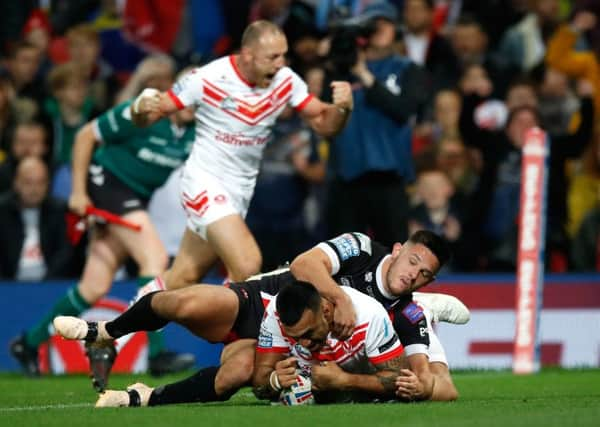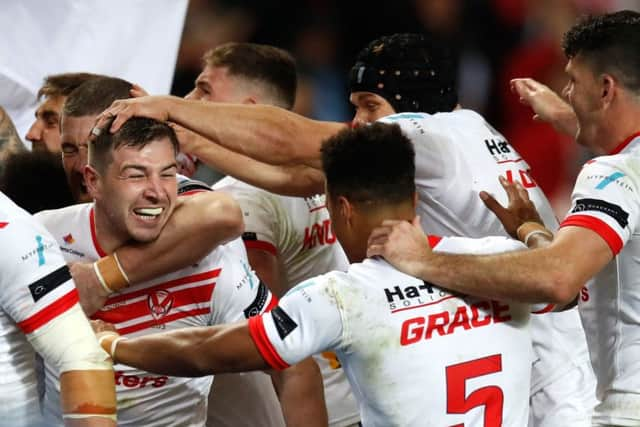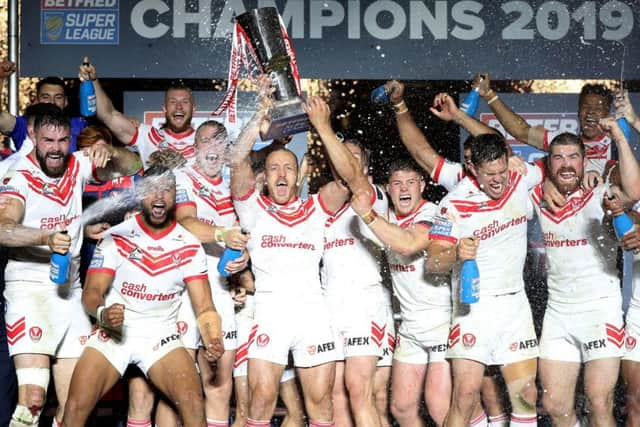The Verdict – St Helens get their Grand Final just rewards against Salford Red Devils


Of the competition’s 22 Grand Finals, since the first in 1998, half have been won by the league leaders.
The past three campaigns have produced an emphatic result on the table, Castleford Tigers in 2017 and St Helens last year finishing top by a 10-point margin and then Saints achieving a record 16-point gap this term.
Advertisement
Hide AdAdvertisement
Hide AdBut Castleford were out-played by Leeds at Old Trafford and St Helens failed to even reach the title decider 12 months ago, slipping up at home to Warrington Wolves in a knockout semi-final.


Both those Grand Final outcomes added fuel to suggestions the league leaders should be crowned champions, possibly with an additional trophy, similar to the now defunct Premiership, for play-offs winners.
The counter argument is that rugby league, starved of media attention and big occasions, can’t afford to lose it’s major showpiece, and the income from a bumper crowd, particularly with the Challenge Cup in serious decline.
The credibility of the competition was on Saints’ shoulders at Old Trafford on Saturday. There has been no doubting their status as Super League’s best team this year, having lost only three times in 29 league matches and two of those being when they fielded an under-strength team away to bottom club London Broncos.
Advertisement
Hide AdAdvertisement
Hide AdBut since Justin Holbrook took over as coach, midway through 2017 when they were floundering in mid-table, Saints had lost two league semi-finals, one in the Challenge Cup and been beaten at Wembley this year.


Had Salford – who finished third in the table, 18 points behind Saints – pulled off a shock at Old Trafford it would have been difficult to justify the current format, but Holbrook’s men, in his last game at the helm before joining Gold Coast Titans, for once held their nerve.
Salford, playing their first major final of the summer era, gave a good account of themselves, but Saints dominated throughout and were full value for a 23-6 victory which secured their sixth Grand Final success and seventh Super League title.
It meant Super League enjoyed the best of both worlds; not only did the most dominant side lift the trophy, but also Salford’s unexpected appearance in the final created extra interest and while the crowd of 64,102 was the lowest for a decade, it was better than some critics had feared.
Advertisement
Hide AdAdvertisement
Hide AdWhether Saints have been exceptionally good this year, or simply much better than the rest of a mediocre competition, is a matter for debate and the answer is probably a bit of both.
They are a very impressive side, but the overall standard in 2019 was poor, which partly explains Salford’s meteoric rise up the ladder after they finished 10th in Super League last year.
The Red Devils are a well-organised team, who do the basics well, work hard for each other, defend strongly and boast an outstanding pivot in Man of Steel Jackson Hastings.
Against a Saints outfit firing on all cylinders, that wasn’t enough, though Salford were not overawed or blown away as had been the fear before kick-off.
Advertisement
Hide AdAdvertisement
Hide AdSt Helens were on top throughout, but couldn’t breathe easily until the hour mark when a penalty goal ensured Salford would need to score three times to pull the game from the fire.
Tries by Morgan Knowles and Zeb Taia, both of which Lachlan Coote converted, gave them a 12-0 lead in the first half, but Jake Bibby’s try, improved by Krisnan Inu, kept things interesting at half-time.
Mark Percival scored from his own kick 10 minutes into the second half, after a spell of Salford pressure, to steady the league leaders’ nerves and Coote maintained his 100 per cent record with the boot by tagging on the two and then booting two penalties.
Saints, appropriately, led by 16 points until the 78th minute when Tommy Makinson – playing through the pain of a dislocated shoulder– landed an impressive 40-metre drop goal, the first of his career.
Advertisement
Hide AdAdvertisement
Hide AdIt was a team effort from Saints, but front-rower Luke Thompson received the Harry Sunderland award as player of the match for a tireless 72-minute stint, making 27 carries and 42 tackles.
St Helens: Coote, Makinson, Naiqama, Percival, Grace, Lomax, Fages, Walmsley, Roby, Thompson, Taia, Peyroux, Knowles. Substitutes: McCarthy-Scarsbrook. Amor, Ashworth, Smith.
Salford Red Devils: Evalds, Sio, Welham, Bibby, Inu, Lolohea, Hastings, Mossop, Tomkins, Dudson, Jones, Griffin, McCarthy. Substitutes: Lussick, Flanagan, Walker, Burke.
Referee: C Kendall (Huddersfield).